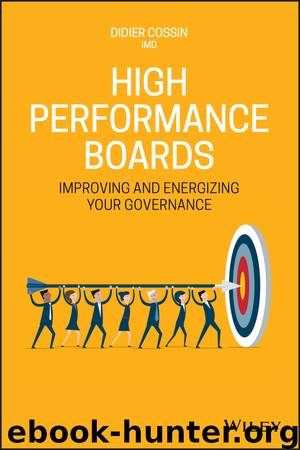High Performance Boards by Didier Cossin

Author:Didier Cossin
Language: eng
Format: epub
ISBN: 9781119615699
Publisher: Wiley
Published: 2020-04-14T00:00:00+00:00
Financial Illiteracy
Directors often see themselves as generalists. They pay significant attention to important board topics such as leadership, strategy, innovation, or relations with the CEO, but tend to regard accounting and finance as a ‘technical’ subject for specialists. As a result, financial illiteracy is rampant on corporate boards. (In the hope of changing this state of affairs, Chapter 16 provides a primer on finance essentials for directors.)
Running a business without understanding basic financial and accounting concepts is dangerous, because it creates opportunities for executives to manipulate financial results and commit fraud. Boards lacking specialised knowledge cannot prevent, detect, or intervene in fraudulent activities effectively.
Financial illiteracy at board level is a lesson learned hard. After the Enron scandal, the SEC and other US regulators tightened the criteria for membership of boards and audit committees of public companies. Audit committees are now required to consist of independent directors, with at least one member being a ‘financial expert’. This is defined as a person with fluent knowledge of US Generally Accepted Accounting Principles (GAAP), who has experience preparing, auditing, analysing, or evaluating complex financial statements in depth, and understands internal controls, financial reporting procedures, and audit committee functions. Every public-listed company board should have sufficient accounting and auditing expertise to provide effective fraud oversight.
However, independent directors who are financial experts may lack the specific industry knowledge to check intricate and carefully concealed insider misconduct. And although boards and audit committees may comply with the financial expert requirements, effective fraud oversight lies in the nuances of structures and processes. If internal control mechanisms and external auditors report functionally and administratively to management, rather than to the board or audit committee, this weakens the independent check on executives. The same is true if independent expert directors cannot freely meet employees, customers, and suppliers and have to rely on information from management.
By comparison, privately held companies generally have fewer or less comprehensive reporting requirements and transparency obligations. Financial literacy on boards and audit committees is not a legal requirement for private firms, which may lead to similarly large scandals.
Theranos, a privately held Silicon Valley start-up, was valued at $9 billion in 2015 because of its ‘breakthrough advancements’ in blood-testing technologies. The company claimed that its technology would enable laboratories to run medical tests with a finger-prick of blood. Theranos' original board consisted of retired government officials with no medical or technology experience, and no accounting or auditing expertise. Theranos' former CFO Henry Mosley had been fired in November 2006 after questioning the company's honesty and the reliability of its technology, and since then Theranos had only had a corporate controller. The company failed to prove its scientific claims, and its technology was seen as a fraud following civil and criminal investigations by US authorities in 2018.
Download
This site does not store any files on its server. We only index and link to content provided by other sites. Please contact the content providers to delete copyright contents if any and email us, we'll remove relevant links or contents immediately.
Time Management Made Easy: How to Cultivate New Habits, Improve Productivity and Get Things Done by Joshua Strachan(2419)
The 7 Habits of Highly Effective People by Stephen R. Covey & Sean Covey(2268)
The Concise Laws of Human Nature by Robert Greene(1914)
Doesn't Hurt to Ask by Trey Gowdy(1640)
Primal Leadership by Daniel Goleman(1283)
Hook Point: How to Stand Out in a 3-Second World by Brendan Kane(1247)
Don't Sweat the Small Stuff...and It's All Small Stuff by Richard Carlson(1121)
HBR's 10 Must Reads 2021 by unknow(1097)
The Power of 100! by Shaun King(1097)
Amazon Unbound by Brad Stone(1045)
100 Things Successful People Do by Nigel Cumberland(1030)
Master of One by Jordan Raynor(1008)
HBR's 10 Must Reads 2021 by Harvard Business Review(1007)
The Job Closer by Steve Dalton(994)
Lives of the Stoics by Ryan Holiday & Stephen Hanselman(969)
Declutter Your Mind: A step by step guide to learn to control your thoughts, stop worrying, relieve anxiety and eliminate panic attacks and negative thinking by Mia Chandler(969)
Conflicted by Ian Leslie(872)
The Book of Hope by Jane Goodall(872)
Coders at Work: Reflections on the craft of programming by Peter Seibel(848)
